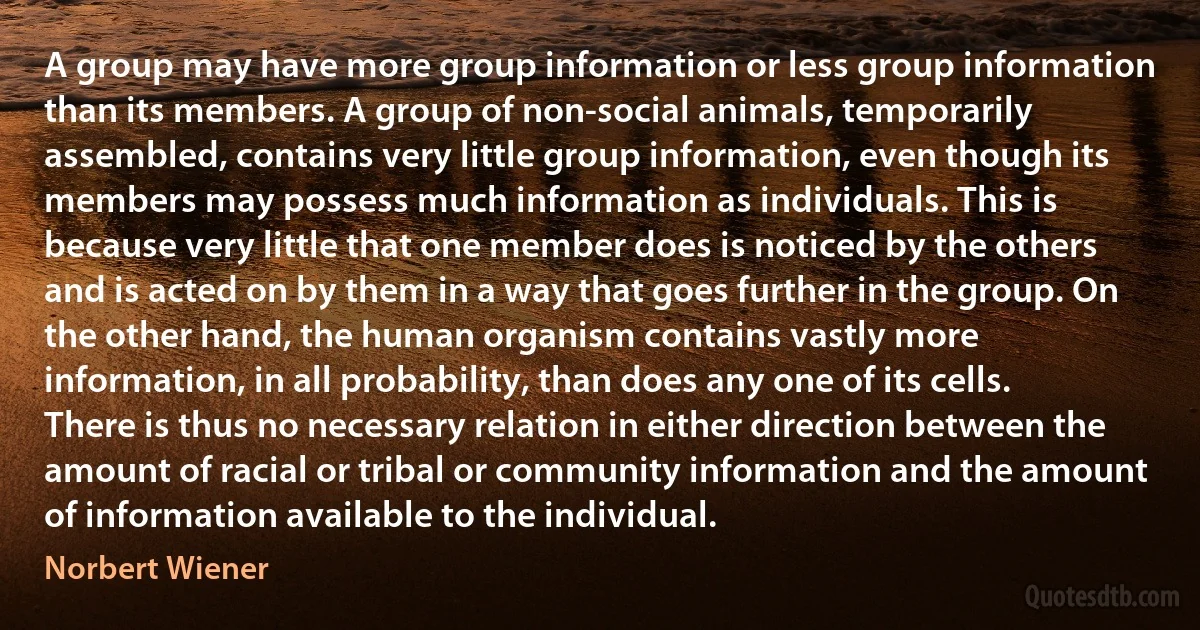
A group may have more group information or less group information than its members. A group of non-social animals, temporarily assembled, contains very little group information, even though its members may possess much information as individuals. This is because very little that one member does is noticed by the others and is acted on by them in a way that goes further in the group. On the other hand, the human organism contains vastly more information, in all probability, than does any one of its cells. There is thus no necessary relation in either direction between the amount of racial or tribal or community information and the amount of information available to the individual.
Norbert WienerRelated topics
direction human less necessary organism probability racial thus tribal way othersRelated quotes
Britain is not earning her living. We are not keeping pace with the economic performance of our European and North American neighbours, and we are certainly not achieving the potential that is in us. ... At the end of a war of prolonged sacrifice we were left with much obsolete industrial plant, and a short-fall in the capital necessary to scrap and renew it. For a century we had lived on cheap food and raw materials imported from overseas. They are not and will not in future be available to us. ... We cannot continue to live beyond or ability or our willingness to earn. That is the one basic fact with which Britain has yet to come to terms.

Alec Douglas-Home
But, whenever a portion of this facility we may suppose even the greatest Poet to possess, there cannot be a doubt that the language which it will suggest of him, must, in liveliness and truth, fall far short of that with is uttered by men in real life, under the actual pressure of these passions, certain shadows of which the poet thus produced, or feels to be produced, in himself. However exalted a notion we would wish to cherish of the character of a Poet, it is obvious, that, while he describes and imitates passions, his situation is altogether slavish and mechanical, compared with the freedom and power of real and substantial action and suffering.

William Wordsworth
The professional administrators - especially those at higher levels - serve key roles at the boundary of the organization, between the professionals inside and interested parties - governments, client associations, and so on - on the outside. On the one hand, the administrators are expected to protect the professionals' autonomy, to "buffer" them from external pressures. On the other hand, the administrators are expected to woo these outsiders to support the organization, both morally and financially. Thus, the external roles of the manager-maintaining liaison contacts, acting as figurehead and spokesman in a public relations capacity, negotiating with outside agencies-emerge as primary ones in professional administration.

Henry Mintzberg
In the mass movement into the suburban areas a new kind of community was produced, which caricatured both the historic city and the archetypal suburban refuge: a multitude of uniform, unidentifiable houses, lined up inflexibly, at uniform distances, on uniform roads, in a treeless communal waste, inhabited by people of the same class, the same income, the same age group, witnessing the same television performances, eating the same tasteless prefabricated foods, from the same freezers, conforming in every outward and inward respect to a common mold, manufactured in the central metropolis. Thus the ultimate effect of the suburban escape in our time is, ironically, a low-grade uniform environment from which escape is impossible.

Lewis Mumford
Remember when I told you, for the first time? You nearly threw me off the roof-”
"I thought you deserved it. You know, it's an opinion I return to from time to time, whether or not a roof is available.”
"You're a difficult woman, Sabetha. But then, difficult women are the only ones worth falling in love with.”
"How would you know? It's not like you've ever been after anyone else-”
"That part's easy. I started with the most difficult woman possible, so there was never any need to look any further.”
"You're trying to be charming.” She squeezed his hand once, then pulled away. "I choose not to be entirely charmed, Locke Lamora.”
"Not entirely?

Scott Lynch
